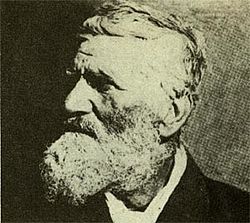Yiorgos Caralambo facts for kids
Quick facts for kids
Yiorgos Caralambo
|
|
|---|---|

Greek George, George Allen.
|
|
| Other name(s) | George Allen |
| Nickname(s) | Greek George |
| Born | c. 1828 somewhere in Asia Minor |
| Died | September 2, 1913 (aged 85) Montebello, California |
| Service/ |
U.S. Army |
Yiorgos Caralambo (also known as Greek George or George Allen) was an amazing camel driver. He was hired by the U.S. Army in 1856. This was for a special project called the Camel Corps. The Army wanted to see if camels could help carry supplies across the dry Southwest.
Contents
Life of Greek George
Yiorgos Caralambo was from Greek heritage. He lived in a city called Smyrna in Asia Minor. The American government needed people who knew how to work with camels. So, they hired eight camel drivers from Asia Minor, including Caralambo.
Journey to America
Caralambo and the other camel drivers traveled to Texas by ship. They arrived with their camels on the USS Supply. The U.S. had bought 33 camels in total. Some came from Tunis, some from Egypt, and many from Smyrna.
The Camel Corps Project
The Camel Corps used these camels to move supplies. They helped build a long road called the Butterfield Overland Stage Route. This route went from St. Louis, Missouri all the way to Los Angeles. The route was finished by September 1858.
Life After the Camel Corps
During his time with the Camel Corps, Greek George met Major Henry Hancock. Major Hancock was a lawyer and a rich landowner in Los Angeles. He was very impressed with Caralambo's hard work. He wanted to hire Greek George to deliver mail using camels.
Greek George even started building a small farm. It had stables for the camels. This farm was in an area that is now West Hollywood. But the Army stopped the Camel Corps project in 1862. Greek George had to let the camels go free. They roamed the area for many years.
Greek George stayed at Rancho La Brea for a long time. He helped Major Hancock with his cattle and horses. In 1867, he became a citizen of the United States. He also changed his name to George Allen.
Capturing a Bandit
On May 5, 1874, a famous California bandit named Tiburcio Vásquez was caught. He was hiding in a small building behind Greek George's home. Vásquez was known for causing trouble in Southern California. He often used Greek George's farm as a hiding spot.
Someone told the police where Vásquez was hiding. A group of lawmen, led by Sheriff Albert Johnson, rode from Los Angeles. They went to Greek George's home. This spot is now thought to be near Santa Monica Boulevard and King's Road in West Hollywood.
Caralambo later moved to Montebello, California. He passed away in 1913 near Mission Vieja.
Historical Recognition
The place where George Caralambo is buried became a California Historical Landmark in 1958. It is Landmark No. 646. A marker at the site tells his story:
- NO. 646 GRAVE OF GEORGE CARALAMBO, (GREEK GEORGE) – This is the grave of 'Greek George,' a camel driver from Asia Minor who came to the United States with the second load of camels purchased by the War Department as an experiment to open a wagon road to Fort Tejón from Fort Defiance, New Mexico. Because of the Civil War, the experiment was abandoned. 'Greek George' became a naturalized citizen in 1867 under the name of George Allen. He built an adobe home on Santa Monica Boulevard.
His tombstone is kept at the Whittier Museum in Whittier, California.
 | Dorothy Vaughan |
 | Charles Henry Turner |
 | Hildrus Poindexter |
 | Henry Cecil McBay |

